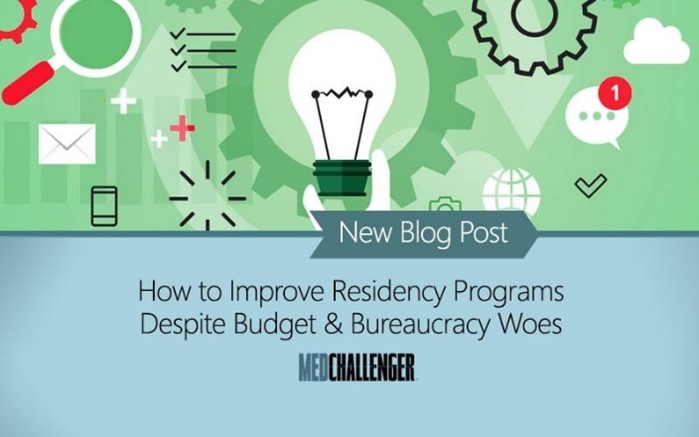How to Improve Residency Education Despite Budget and Bureaucracy Constraints
Residency Directors Facing Budget Cuts & More Bureaucracy Can Improve Resident Education Outcomes Easily
< All Posts
Share this article
Subscribe
Subscribe

Residency Program Budgetary & Bureaucratic Constraints Don’t Have to Prohibit Residency Program Improvements
Increasingly, Residency directors find themselves without the ability to make prudent, timely improvements to their programs. Many residencies have had their independent budgets removed. Most purchasing for HCA residencies, for instance, are made in the corporate offices, rather than on-site at the individual residencies.
Numerous organizations are calling for the expansion of graduate medical education (GME) positions nationally. Developing new residency programs and expanding existing programs can only happen if financial resources are available to pay for the expenses of residency training beyond what can be generated in direct clinical income by the residents and faculty in the program.
In 2018, the median cost per resident among these programs, excluding federal GME funds, is currently $179,353; this amount has increased over the 12 years by 93.7%
“Developing new residency programs and expanding existing programs can only happen if financial resources are available.”
Short-term residency funding and grants can help with program start-up expenses, but tend to underestimate the ability of programs to remain financially stable over the long-term.
In considering short-term solutions it is important to acknowledge the long life cycle of a class of residents, with 1 year of recruitment, followed by a number of years of training (three for family medicine, longer for psychiatry and surgical programs).
This long start-up period for new programs does raise the question about the possibility of expanding existing programs when possible as a less expensive and faster method of increasing workforce.
Fact is, if you’re a residency program director, you might be stuck between competing perspectives – and all you want is help improving resident knowledge, exam pass rates and matriculation rates. And, you don’t want to wait around.
The biggest obstacles to residency education improvement are high acquisition costs, operational disruption concerns, and multi-party, decision-making bureaucracies that grind every program decision to a standstill. So, the solution must be something that provides flexible acquisition (affordable, scalable), implementation (instant, no IT hassles), and usage (easy to use, multi-use) options – and verifiable outcome improvement (real results and insights).
“The biggest obstacles to residency education improvement are acquisition costs, operational disruption concerns, and multi-party, decision-making bureaucracies.”
Residency Education Solutions That Are Powerful, Painless, and Cost-Effective
If you want to improve your program outcomes – you need solutions that are flexible enough to fit your program quickly. The most powerful and easiest solution is online. And what all you can do might surprise you.
Med-Challenger’s online residency assessment software offers up-to-date content, assessments, assignment controls, and analytics – on-demand online – gives program directors faster ways to improve resident performance and program outcomes.
Cost Effective Residency Education & Assessment
A good purchase boils down to expense vs. value, right? As a residency director, would you like to have effortless materials, learner controls and predictive insights in your hands? You might hesitate – it’s got to be too good to be true – or WAY too expensive. What if those valuable abilities didn’t require a ton of money?
Fact is, the best online resident education platforms provide everything needed to drive outstanding resident outcomes in an all-in-one resident education platform that’s both affordable and effective.
Such online platform services remove many costs related to lost faculty time, labor in managing materials, and performance data chases across multiple trainees – across multiple locations.
Zero Operational Concerns – No IT needs, instant on.
Operational concerns are typically implementation complexity and labor, technical conflicts with existing computer applications, and platform management labor.
The best online resident education systems are free-standing web-based applications that do not require any local IT implementation or labor. “Out of the box” materials and features mean there are no operational costs or perils – only new operational efficiencies. And, one screen to assign, control, track, and analyze everyone everywhere.
Easy Purchasing. When Too Many Decision-makers Stop Everything – You Can Still Act.
The most frustrating part of residency management is not having the power to make decisions. However, some decisions don’t really require buy-in from everyone – not if purchasing and implementation is so simple.
Med-Challenger has had program directors purchase online platform resources themselves –using a simple credit card – because they have struggling residents they need to help today. Online residency education services are instant on, instant off and flexible. There’s no reason to delay adding online education because you can implement slowly and add services as you go. You’ll see the results and so will every other stakeholder.
No matter your program, no matter the size, Med-Challenger for Residencies can better prepare your residents and increase test scores while remaining cost effective. Sign up for a live demo now for more information.
For personal medical education that includes board's prep, MOC, and CME requirements, Med-Challenger has you covered in Family Medicine, Emergency Medicine, Internal Medicine, Pediatrics, Pediatric Emergency Medicine, OBGYN, Physician Assistants, and Nurse Practitioners!